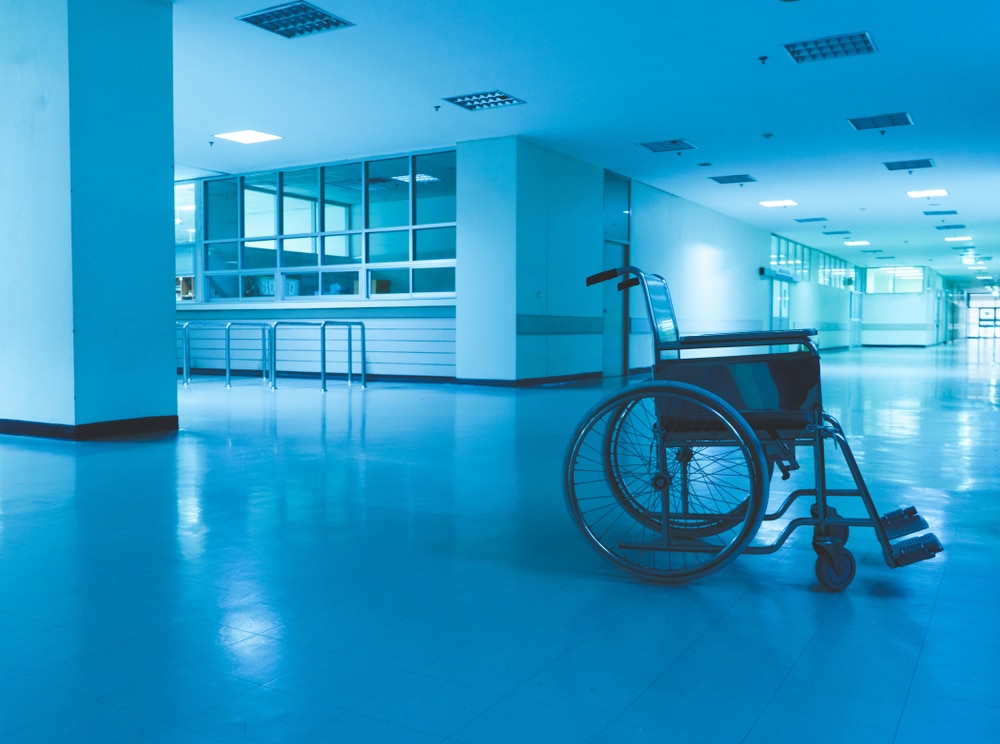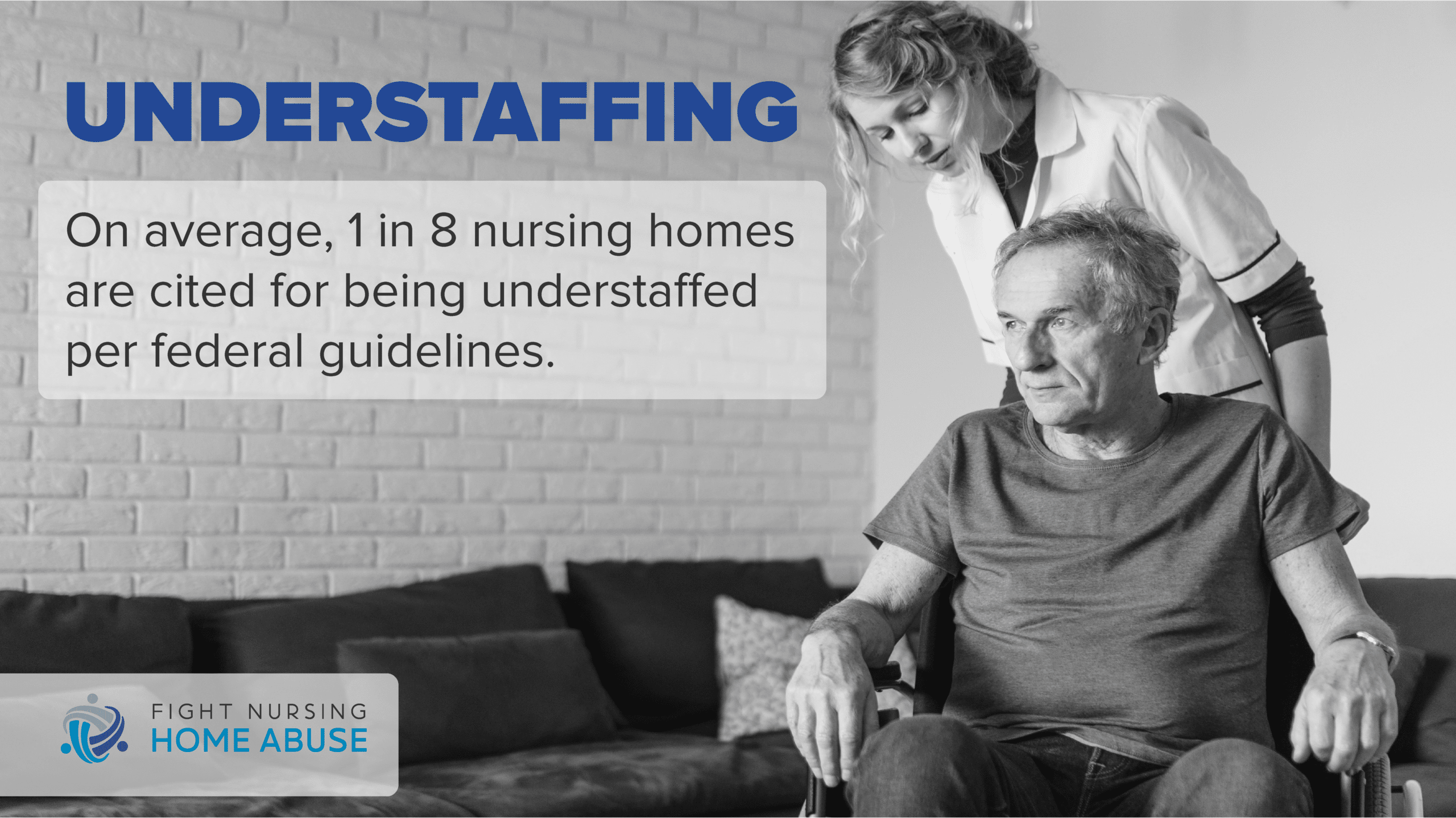Understaffing

Could your loved one suffer due to understaffed nursing homes? A July 2018 article in U.S. News & World Report revealed that 1 in 11 of the nation’s nursing facilities falls short of required staffing levels. Understaffing and overworked nursing home staff increases the likelihood of abuse and neglect. Unfortunately, understaffing is a chronic problem in nursing homes.
If you believe your loved one is suffering as a result of understaffing in a nursing home, a nursing home abuse lawyer may be able to help. Call 1-866-548-9636 for a free consultation.

New Data Shows Reality of Understaffing in Nursing Homes
The 2018 report showed that as many as 1,400 nursing homes consistently had a low number of total staff including Registered Nurses (RNs) and other caregivers. Additional findings from the report include:
- For-profit nursing homes had an average of 16% fewer employees than nonprofit facilities.
- There was one RN for every 43 residents at most for-profit facilities.
- There was one RN for every 23 residents at most nonprofit facilities.
Nursing homes are required to send payroll information to Medicare due to new provisions enacted by the 2010 Affordable Care Act. These updated payroll records reveal dangerously low and fluctuating staff levels. Examples include:
- One Licensed Nurse (LN) caring for as many as 33 residents on an average day.
- One Certified Nursing Assistant (CNA) or other aide caring for an average of nine to 16 residents.
- Staff levels drop even lower on weekends, with 11% fewer RNs and eight percent fewer CNAs or aides.
Fewer Staff Could Mean More Nursing Home Abuse and Neglect
Nursing home abuse and neglect are more likely to occur when there is insufficient staff. It is easy for even professional caregivers to experience burnout or make mistakes when they are caring for so many residents. In a 2012 study by the National Center on Elder Abuse, more than 50% of nursing home workers reported abusing or neglecting their patients.
The Impact of Understaffing on Nursing Home Residents
Residents suffer when there is a shortage of trained nursing home staff. These shortages are not accidental—reducing staff means the nursing home can spend less on wages and employee benefits, which boosts a facility’s profit margin at the expense of its residents.
Chronic understaffing leads to:
- Complications supplying food at regular intervals. This can lead to dehydration and malnutrition, particularly for residents who need help feeding themselves.
- Difficulty dispensing medication on a routine schedule, which can aggravate health problems the medication is intended to control.
- Increased bedsore risk for immobile patients who must be turned on a regular basis.
- Greater risk of fall injuries because there is not enough staff to help ambulatory residents.
- Exhausted caregivers who become more likely to use excessive force or violence when carrying out their tasks.
The Dangers of Overtime Shifts
Because so many facilities are understaffed, employees are often asked to work overtime. This could mean working longer hours or forgoing a day off to pick up an extra shift. While overtime pays more, the added hours take their toll on both staff and residents. Consider the following:
- Exhausted caregivers are more likely to make mistakes when giving medication to residents.
- Caregivers who consistently work overtime may take out their frustration on residents.
- Overworked employees contribute to a higher rate of turnover.
Why There Is a Shortage of Nursing Home Staff
Nursing homes are chronically understaffed for several reasons:
We Are All Getting Older
Our national population is aging, increasing the annual demand for nursing facilities. By 2030, 20% of Americans will be over age 65. Thanks to improved health habits and modern medicine, the number of seniors who are 85 will double or triple by that time.
Government Cuts in Reimbursement Even as Demand Increases
Many seniors depend on earned benefits such as Medicare and Medicaid to help pay for their long-term nursing care. However, in 2011, the federal government cut Medicare reimbursement to nursing homes by 11%. In addition, fewer seniors are selling their homes to fund their nursing home care. Many seniors had their homes foreclosed from the 2008 housing collapse or saw their home’s value decreased. This contributes to more reliance on government resources.
Nationwide Nursing Shortage
America is experiencing a nationwide nursing shortage. According to the American Association of Colleges of Nursing, the country will need 1.09 million more registered nurses by 2024. Nursing homes compete with hospitals and other healthcare providers for qualified nurses in a high-demand market.
Certified Homes Cannot Turn Away Medicaid Patients
Medicaid-certified homes are legally prohibited from turning away Medicaid patients who no longer have financial resources to pay for care. Nursing homes must stretch their operating budget to accommodate these patients.
Your Loved One Should Not Suffer from Understaffing in Nursing Homes
If you believe a loved one is the victim of abuse or neglect because of an understaffed nursing home, you have options. To learn more about how a nursing home abuse lawyer may be able to help, call 1-866-548-9636 today. Let Fight Nursing Home Abuse help you protect your loved one. Call us today for a free consultation.


